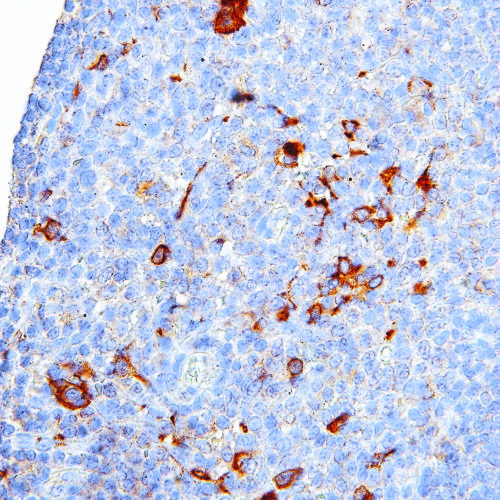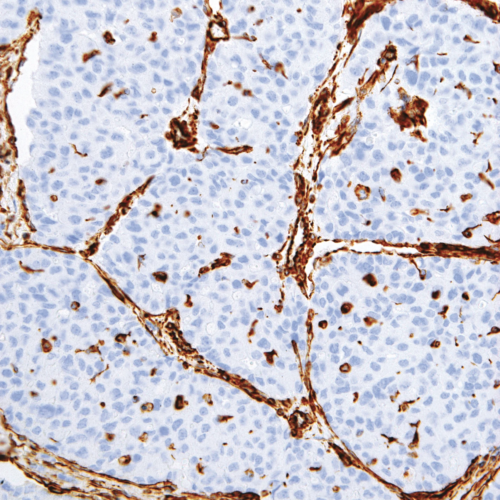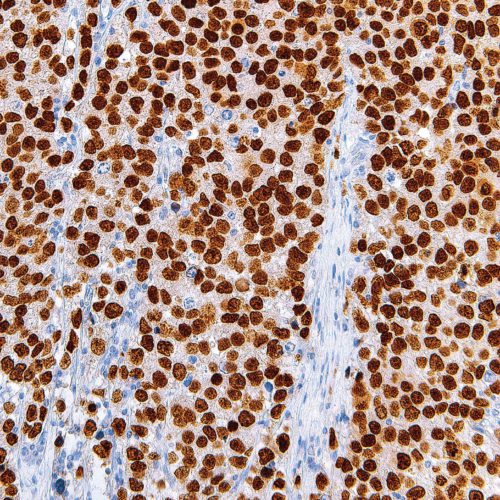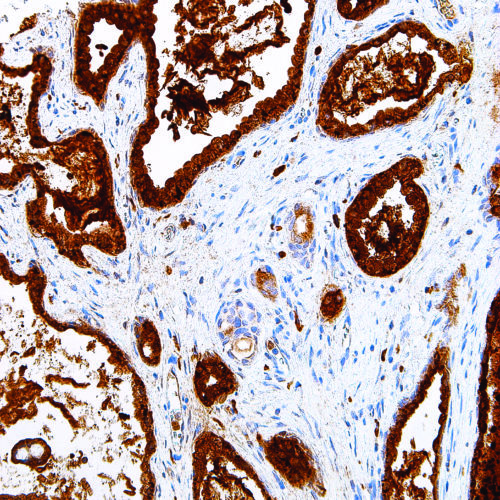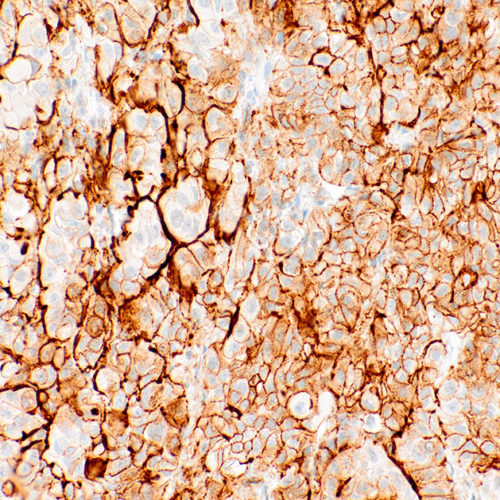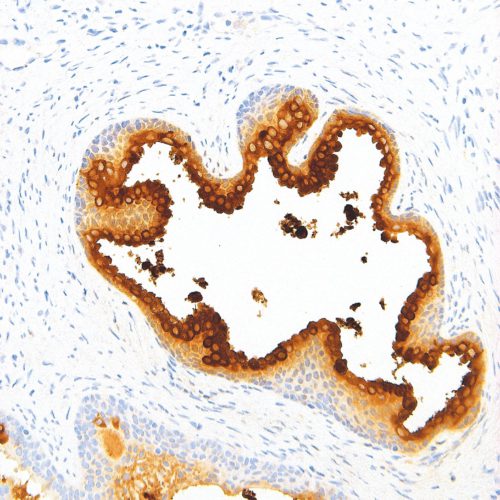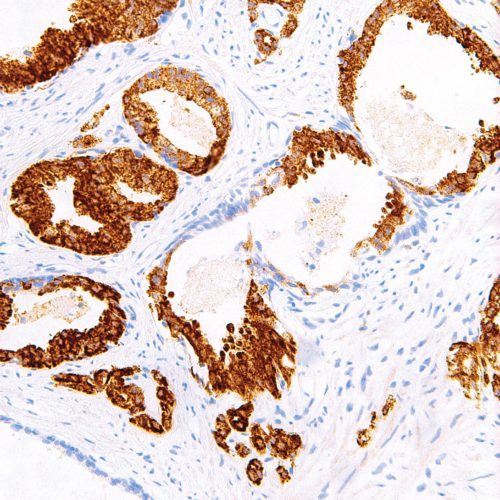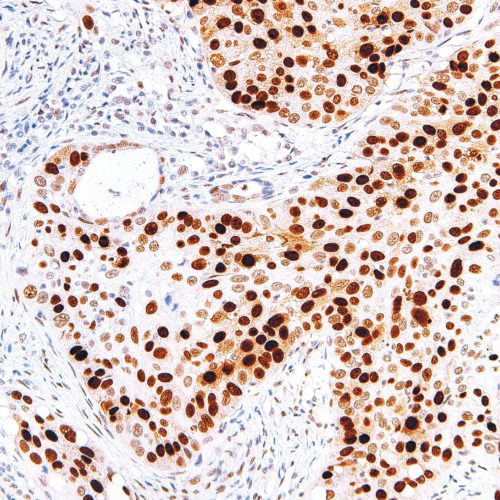High quality products to support Pathologists and Biological and Environmental Scientists
GeneAb™ CTLA-4
$129.00 – $989.00Cytotoxic T-Lymphocyte-Associated Protein 4 (CTLA-4) is a receptor on T helper cells that functions as an immune checkpoint and downregulator of immune responses. Mutations in CTLA-4 are associated with insulin-dependent diabetes mellitus, Hashimoto’s thyroiditis, Graves’ disease, systemic lupus erythematosus (SLE), celiac disease, primary biliary cirrhosis, thyroid-associated orbitopathy, multiple sclerosis, and other autoimmune diseases. The spliced variant of CTLA-4 in SLE is present in the patient’s serum. Haploinsufficiency of CTLA-4 causes the immune system disorder known as CTLA-4 deficiency or CHAI disease (CTLA-4 haploinsufficiency with autoimmune infiltration).
GeneAb™ Vimentin
$64.50 – $311.75Vimentin is a component of intermediate filament in mesenchymal cells, such as endothelial cells, fibroblasts, lymphocytes, and melanocytes. Anti-Vimentin is useful for assessing whether tissue samples have been processed and preserved properly. A panel of Anti-Vimentin and Anti-Keratin is useful for differentiating melanomas from large cell lymphomas and undifferentiated carcinomas. This diagnostic grade Vimentin IVD antibody stains melanomas and schwannomas, as well as Endometrial endometrioid adenocarcinomas.
GeneAb™ SALL4
$80.62 – $354.75Sal-Like Protein 4 (SALL4), is a zinc finger transcription factor found in germ cells and human blood progenitor cells, with functional involvement in modulating Oct-4 to maintain embryonic stem cell pluripotency. SALL4 is a useful marker for acute myeloid leukemia, B-cell acute lymphocytic leukemia, intratubular germ cell neoplasia, seminomas/dysgerminomas, and yolk sac tumors (both pediatric and postpubertal). Anti-SALL4 is used to detect embryonal carcinomas, hepatocellular carcinoma (HCC), gliomas, ovarian primitive germ-cell tumors, choriocarcinomas, spermatogonia, teratoma, gastric cancer, breast cancer, and lung cancer. Expression of SALL4 is often associated with poor prognosis in HCC, and with metastasis in endometrial cancer, colorectal carcinoma, and esophageal squamous cell carcinoma.
GeneAb™ PSAP
$59.12 – $225.75Prostatic Specific Acid Phosphatase (PSAP) is a prostatic enzyme found in the glandular epithelium of the prostate. PSAP levels are elevated in hyperplastic prostate and prostate carcinoma, with the highest levels being detected in metastasized prostate cancer. Moderate overexpression of PSAP is also characteristic of diseases of the bone (such as Paget’s disease or hyperparathyroidism), diseases of blood cells (such as sickle-cell disease), multiple myeloma, or lysosomal storage diseases (such as Gaucher’s disease). PSAP is considered more sensitive, yet less specific, than PSA, however Anti-PSAP can act as a useful complement to Anti-PSA under suitable clinical contexts.
GeneAb™ Podoplanin
$91.38 – $526.75Podoplanin is a transmembrane mucoprotein specifically expressed in the endothelium of lymphatic capillaries, while remaining absent from the blood vasculature. The protein is co-localized with VEGFR3/FLT4 in normal skin and kidney. Anti-Podoplanin is useful in the identification of lymphangiomas, Kaposi’s sarcomas, epithelioid mesotheliomas, hemangioblastomas, seminomas, and some angiosarcomas which likely have lymphatic differentiation.
GeneAb™ PSA
$75.25 – $301.00Prostate-Specific Antigen (PSA) is a serine protease of the kallikrein family, that is produced by the prostate epithelium and epithelial lining of the periurethral glands. Although considered prostate-specific, PSA has also been detected in breast tissue, breast tumors, endometrium, adrenal neoplasms, and renal cell carcinomas. Anti-PSA can be used for differentiating high-grade prostate adenocarcinoma from high-grade urothelial carcinoma, as well as for determining the prostatic origin of carcinomas in non-prostate tissues. Anti-PSA recognizes primary and metastatic prostatic neoplasms, but not tumors of nonprostatic origin, and can be useful as an aid to confirm prostatic acinar cell origin in primary and metastatic carcinomas.
GeneAb™ p504s
$86.00 – $306.38p504s, also known as α-methylacyl coenzyme A racemase (AMACR), is an enzyme localized in the peroxisome and mitochondria, which functions in β-oxidation of branched chain fatty acids, as well as bile synthesis. AMACR has been clinically indicated as a tissue biomarker for prostate cancer and colorectal cancer, as well as high-grade prostatic intraepithelial neoplasia, a precursor lesion of prostate cancer. p504s overexpression has also been detected in a number of other cancers including ovarian, breast, bladder, lung, and renal cell carcinomas, lymphoma, and melanoma.
GeneAb™ p53
$75.25 – $301.00p53, also known as tumor protein 53 or TP53, is a tumor suppressor and transcription factor that functions in a number of anti-cancer activities including DNA repair, cell-cycle arrest, and apoptosis in response to DNA damage or other stressors. Mutations in p53 are linked to a number of malignant tumors, including those of the breast, ovarian, bladder, colon, lung, and melanoma. Anti-p53 staining has been used to detect intratubular germ cell neoplasia, and also to distinguish between uterine serous carcinoma and endometrioid carcinoma.
